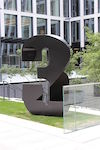 Image: Threshold, a sculpture that looks different from different angles, by James Hopkins. Photo courtesy of Jan Polák at Wikimedia Commons page for sculpture. You can see this sculpture as the numeral 1, 2, or 3 depending on which angle you view it from. Christians often see the same creation story in Genesis from different angles.
Image: Threshold, a sculpture that looks different from different angles, by James Hopkins. Photo courtesy of Jan Polák at Wikimedia Commons page for sculpture. You can see this sculpture as the numeral 1, 2, or 3 depending on which angle you view it from. Christians often see the same creation story in Genesis from different angles.
ESN is currently creating a Faith/Science curriculum for young adult small groups. We’ve partnered with InterVarsity graduate student discussion groups to identify faith/science questions that are important to emerging scholars, and we’re commissioning thoughtful  Christians in science or theology/philosophy to explore those questions in this series at the ESN blog. We will publish these posts as a booklet curriculum for campus groups.
Christians in science or theology/philosophy to explore those questions in this series at the ESN blog. We will publish these posts as a booklet curriculum for campus groups.
Debates over evolution and origins are a challenging area for many Christians as they engage with modern science. To discern how to address these issues in this curriculum, we talked with graduate students, InterVarsity grad staffers, and professors. Based on their feedback, we commissioned two pieces that articulate the major views held by Christians on evolution generally and human evolution in particular. These particular pieces are not designed to argue for a specific position, but to help readers explore the range of positions fellow believers hold on an issue and to increase the ability of Christians to build thoughtful conversations about the theology and science of origins. These posts include discussion questions to help believers better understand each other’s positions on both theology and science. Today, we’re privileged to welcome Gerald Rau, ESN contributor and author of Mapping the Origins Debate (InterVarsity Press 2013).
 This project was made possible through the support of an award from the Science and Theology for Emerging Adult Ministries project at Fuller Theological Seminary. The opinions expressed are those of the author(s) and do not necessarily reflect the views of Fuller or the STEAM project.
This project was made possible through the support of an award from the Science and Theology for Emerging Adult Ministries project at Fuller Theological Seminary. The opinions expressed are those of the author(s) and do not necessarily reflect the views of Fuller or the STEAM project.
How did God create? Different Views Christians Hold
During high school I was taught in church that God created the world in six days. The evidence seemed so overwhelming that only a fool could think otherwise. As a biology major in college I was taught that life evolved over billions of years, and the evidence for that seemed even stronger. As Solomon said,
The one who first states a case seems right, until the other comes and cross-examines. – Proverbs 18:17, NRSV
In my confusion I almost threw out my faith, but in the end, I had to say with Peter, “Lord, to whom shall we go? You have the words of eternal life.” (John 6:68). Then I put the question of how God created on the back burner for almost 20 years.
Perhaps your experience was similar, or perhaps at a Christian college you found that professors in the sciences disagreed with those in the Bible department. How can that be? If Christ is the truth, why do Bible-believing evangelical Christians come to such different answers to such a fundamental question? We agree that God created, but how?
When I began teaching high school biology, I knew I needed to find an answer, so I began reading. Between the two extreme positions I was familiar with (young earth creation and naturalistic evolution), I found a range of models: old earth creation, intelligent design, and several variants of theistic evolution.[1]
However, as I read books written by proponents of each position, it became apparent that many of them had not read one another. Examples abound of overgeneralization based on a single book or author, or terms taken out of context and given a different meaning, leading to false claims about what another position believes, allowing it to be effortlessly picked to pieces. But to quote Solomon again,
If one gives answer before hearing, it is folly and shame. – Proverbs 18:13, NRSV
More importantly, I realized that each model of origins was grounded in a particular theology or interpretation of the Bible, or had an equally well concealed philosophical foundation. While the Bible is inspired, our theology and interpretation of the Bible is not. Many Christians do not realize that there are different theologies, or that each theology reflects the dominant philosophical, scientific, and social views of a culture. For example, it is true that many of the church fathers taught that every creature was brought into being instantaneously, as a fully-formed adult, but they also taught that all physical objects on earth are made of the four basic elements (water, earth, air, fire), that there was a firmament physically separating the earth from the heavens, and that living things continue to spring into existence from the dust and mud.[2]
A majority of evangelical Christians in the US believe God created humans directly,[3] within the past 10,000 years, a view commonly known as young earth creation (YEC).[4] For much of the twentieth century, the study Bible of choice for many Baptist, Pentecostal and non-denominational churches was the Scofield Bible. Margin notes pegged the date of creation at 4004 BC, following the genealogical calculations of Archbishop James Ussher. Based on dispensational theology, with four of the seven dispensations being pre-Mosaic, the historicity of Genesis was taken for granted. Although dispensational theology fell out of favor in the late 20th century, the emphasis on literal interpretation remained. Therefore, it is no coincidence that the YEC model still dominates in these churches, and thus is more prevalent in the US, where these churches are strong, than in Europe.[5]
Old earth creation (OEC) holds that God created in the order listed in Genesis, but the progressive creation interpretation currently most popular in the U.S. says the days must be long time periods, based on the scientific evidence.[6] Philosophically, it rests on the foundation that the Bible and scientific evidence, interpreted correctly, can never be in conflict (concordism). However, whereas young earth is committed to the principle that where the unchanging Word of God and ever-changing science appear to be in conflict, obviously it is the former we should believe, old earth recognizes that although the Bible is authoritative, our explanations of its meaning are just as subject to revision as our scientific theories.
Intelligent design (ID) makes two main claims, that design is detectable and that Darwinism is inadequate to account for the diversity of life on earth.[7] The former is primarily a philosophical claim, but has theological implications for the knowability of God and the degree to which God has revealed himself in natural revelation, through his creation. The latter is a scientific claim supported by a growing number of scientists who state that natural selection (the core of Darwinism) is insufficient to account for the evolutionary patterns observed, positing additional natural mechanisms.[8] Although these studies are often cited by ID, most of these scientists accept common descent and few would support the claim that design is detectable. ID is a “big tent” in terms of scientific interpretation—while most proponents of ID hold to an OEC model, there are also supporters of YEC and theistic evolution.
Theistic evolution (TE) is also a “big tent,” but in this case the diversity is theological rather than scientific.[9] Any attempt to discuss TE without recognizing these differences is bound to fail. Scientifically, it is essentially identical to naturalistic evolution,[10] but theologically the range is broad enough that it needs to be divided into at least three categories. Directed evolution (DE), grounded in a conservative framework such as Reformed theology,[11] holds that God in some way directed each step of the process. Planned evolution (PE) asserts that the process was created in a way that it did not need further direction, and includes individuals from a variety of theological positions including Methodists and related groups in the holiness tradition,[12] Anglicans,[13] and Roman Catholics.[14] Non-teleological evolution (NTE) thinks that the outcome was not known by God, and includes some authors more liberal than the official position of their church[15] as well as those rooted in process theology.[16] Since this broad group includes most mainline denominations, TE is the dominant Christian model of origins in Europe.
One of the most important intersections of science and theology is the origin of mankind, including the historicity of Adam, and in what way sin came into the world through Adam (Romans 5:12) but this will require a separate discussion. What is clear is that any shift in position on origins entails a shift in theology, which may affect your relationship with your church, friends, and family.
Summary
The perspective from which we view the evidence determines what we see and what is hidden. What makes perfect sense from one perspective appears to be nonsense to someone from a different viewpoint. To understand another’s view we cannot put them in a box of our choice and look into that box. We must stand next to them and listen while they explain what they see. In doing so, sometimes we will be able to point out things they have not noticed, but perhaps we will decide their view is not so bad after all.
Discussion questions
- What is the position of your family or church on this issue? What would happen to your relationship with family, friends, church if you questioned that position?
- How much have you read about the position you currently hold? Could you defend that position scientifically? How about theologically?
- How much have you read of what other positions say (not what is said about them, but what they themselves say; not to find fault, but to understand)?
- Psalm 19:1 tells us, “The heavens are telling the glory of God; and the firmament proclaims his handiwork.” How much can we know about God from his creation, apart from the Bible?
- What is the purpose of the early chapters of Genesis? Does it tell us how God created the world, or only who created it? What type of literature is it: scientific, historical, didactic, archetypical, allegory, myth, ’? Is it possible that something could be true in one sense but not another (philosophical but not scientific, theological but not historical, etc.)?
- If the Bible and science appear to be in conflict, how should we seek to resolve that conflict?
- For questions 4-6, What is the foundation of your answer: what evidence, what reasoning, what presuppositions?
Notes
[1] Rau, Mapping the Origins Debate, IVP 2012.
[2] Louth (ed.), Ancient Christian Commentary on Scripture, OT 1, Genesis 1-11, IVP 2001.
[3] According to a recent Pew survey, the percentages of Americans who believe “humans always existed in present form” vs. “humans evolved over time” for evangelical, traditionally black, mainline protestant and Catholic churches were, respectively, 57:38, 45:50, 30:65, and 29:66. Pew Research Center, Nov. 3, 2015, “U.S. Public Becoming Less Religious” pp. 206-208. http://www.pewforum.org/2015/11/03/u-s-public-becoming-less-religious/
[4] Ham, The New Answers Book 1, AIG 2006.
Answers in Genesis, https://answersingenesis.org/
[5] Ironically, the study notes in the Scofield Bible actually promote gap theory, one version of OEC. See https://biologos.org/blogs/ted-davis-reading-the-book-of-nature/science-and-the-bible-concordism-part-1/P20.
[6] Ross, More Than a Theory, Baker 2009.
Reasons to Believe, https://www.reasons.org/
[7] Meyer, Darwin’s Doubt, Harper One 2013.
Discovery Institute Center for Science and Culture, https://www.discovery.org/id/
[8] Pigliucci & Muller (eds.), Evolution: The Extended Synthesis, MIT Press 2010.
[9] BioLogos, https://biologos.org/
[10] Coyne, Why Evolution is True, Penguin 2009.
[11] Haarsma & Haarsma, Origins, Faith Alive 2011.
[12] Giberson & Collins, The Language of Science and Faith, IVP 2011.
[13] Alexander, Creation Or Evolution: Do We Have To Choose?, Monarch 2014.
[14] Lamoureux, Evolutionary Creation, Wipf & Stock 2008).
[15] Miller, Finding Darwin’s God, Cliff Street 1999.
[16] Haught, Making Sense of Evolution, WJK 2010.

In his freshman year, Gerald Rau cofounded the Intervarsity chapter at Wesleyan University. As a Ph.D. student in plant breeding at Cornell University he helped establish the First Ithaca Chinese Christian Church. After teaching science for many years at the American School in Taichung, he is currently semi-retired, starting an English ministry for international students while teaching scientific writing part-time at National Chung Cheng University in Chiayi, Taiwan. He has written Mapping the Origins Debate (IVP) and is working on publications on an eclectic array of topics including human origin, philosophy of science, scientific writing, and teaching English as a lingua franca.

Leave a Reply